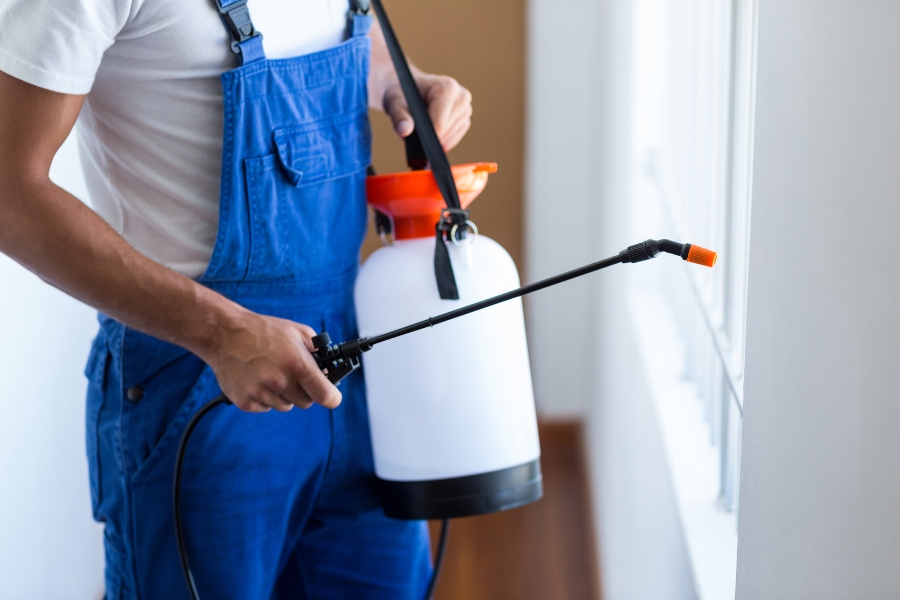Pest Control Clovis Solutions: Professional Provider at Your Front door
Pest Control Clovis Solutions: Professional Provider at Your Front door
Blog Article
Comprehending the Numerous Methods to Bug Control: A Comprehensive Guide

All-natural Bug Control Approaches
Using eco-friendly strategies such as friend growing and organic bug control is crucial for properly taking care of bugs in agricultural settings. Buddy planting involves expanding various crops in proximity to deter pests, improve nutrient uptake, and improve overall plant wellness. As an example, planting marigolds alongside tomatoes can aid drive away nematodes. Intercropping maize with legumes can interfere with the reproduction patterns of bugs like corn borers.
Organic pest control includes introducing natural predators or virus to manage pest populaces. Ladybugs, as an example, prey on aphids, controlling their numbers without the demand for chemical pesticides. One more instance is making use of Bacillus thuringiensis (Bt), a microorganism that targets details insect bugs while being safe to people, pets, and valuable insects.
These eco-friendly techniques not only lower the dependence on artificial pesticides but additionally help protect biodiversity and soil health. By incorporating all-natural parasite control strategies into agricultural methods, farmers can achieve lasting bug management while lessening adverse influence on the environment.

Chemical Bug Control Solutions
In addition to all-natural pest control methods, the usage of chemical bug control remedies plays a substantial role in effectively managing pest populaces in farming atmospheres. Chemical bug control options are created to target certain parasites that might create considerable damages to crops. These services typically consist of synthetic pesticides that are designed to eradicate pests quickly and successfully.
Among the vital benefits of chemical bug control options is their efficiency in controlling pest infestations on a huge range. Farmers can apply these options utilizing various approaches such as splashing, fumigation, or seed treatment to shield their plants from dangerous pests, weeds, and conditions. Furthermore, chemical insect control solutions are reasonably simple to apply and can give fast results, aiding farmers safeguard their yields and lessen economic losses.
Nonetheless, it is vital to use chemical bug control solutions deliberately to lessen potential unfavorable impacts on the atmosphere, non-target microorganisms, and human health. Correct application techniques, adherence to security standards, and regular monitoring are essential to make certain the liable use chemical parasite control services in farming practices.
Biological Insect Control Approaches
Biological pest control approaches leverage natural killers or virus to take care of bug populaces in farming setups successfully. One typical biological control technique is the introduction of natural adversaries, such as ladybugs or parasitical wasps, to target details parasites.
An additional organic control technique includes utilizing pathogens like infections, germs, or fungi to contaminate and eliminate bugs. These microbial agents can be sprayed on plants or introduced into the dirt to deal with various insects without harming useful bugs or various other wild animals. In addition, the usage of scents to interrupt the mating patterns of pests is an additional efficient biological control approach. By conflicting with their reproduction, this approach helps to reduce parasite populations without the need for chemical treatment. In general, organic bug control approaches supply a sustainable and targeted solution to pest monitoring in agriculture.
Integrated Bug Monitoring (IPM)
Integrated Insect Monitoring (IPM) is a comprehensive technique that incorporates various bug control approaches to efficiently take care of and minimize pest populations in farming systems. IPM this concentrates on long-term prevention of bugs via a mix of biological, cultural, physical, and chemical control techniques. By integrating these different techniques, IPM intends to lower reliance on chemical pesticides, reduce ecological impact, and advertise lasting parasite management methods.
One secret element of IPM content is making use of organic controls such as all-natural killers, bloodsuckers, and virus to manage pest populations. This method utilizes the power of nature to preserve a balance between insects and their natural opponents without triggering damage to the environment.
Additionally, IPM involves cultural practices like crop turning, hygiene, and environment manipulation to develop negative problems for insects and disrupt their life cycles. Physical controls such as traps, mulches, and obstacles are additionally used to stop insect infestations.
Mechanical and Physical Parasite Control Strategies
Using non-chemical methods, such as physical and mechanical bug control methods, is a vital element of comprehensive parasite administration strategies, building on the structure of Integrated Insect Monitoring's alternative method. Mechanical parasite control includes the use of physical obstacles or traps to avoid insects from accessing and harming plants or structures. This technique can include methods like installing displays on windows, utilizing row covers in agriculture, or utilizing sticky catches to capture insects.
Physical parasite control approaches, on the various other hand, concentrate on directly removing pests via physical means. Using heat treatments to eliminate bed pests or vacuuming up pests like ants or spiders can be reliable methods to take care of problems without the use of chemicals. By including these physical and mechanical insect control methods right into an Integrated Parasite Administration strategy, specialists and individuals can minimize reliance on pesticides while still successfully handling pest populations and decreasing damage.
Final Thought

In addition to natural parasite control techniques, the application of chemical insect control solutions plays a substantial role in properly handling pest populaces in agricultural settings.One of the essential benefits of chemical parasite control services is their effectiveness in regulating parasite problems on a large range.Integrated Insect Monitoring (IPM) is a detailed approach that incorporates various insect control strategies to properly take care of and reduce pest populaces in agricultural systems.Using non-chemical methods, such as physical and mechanical pest control methods, is an essential element of thorough pest administration approaches, building upon the foundation of Integrated Bug Monitoring's holistic technique. By including these mechanical and physical insect control methods right into an Integrated Parasite Management plan, specialists and people can lower reliance on chemicals while still properly reducing and handling pest populations damage.
Report this page